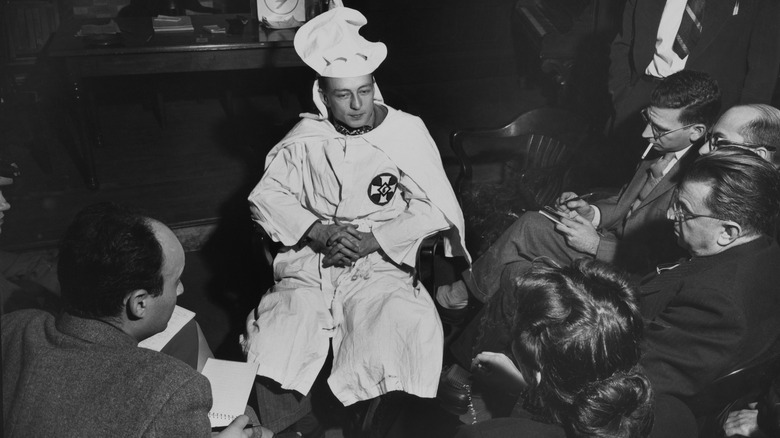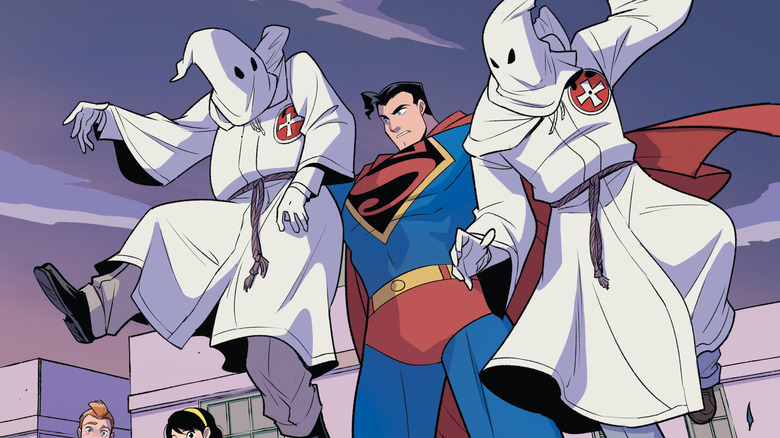How Superman & A Real-Life Undercover Mission Smashed The KKK's Third Wave
Throughout DC Comics, Superman has battled incredible villains like Brainiac and Lex Luthor. Created by Jerry Siegel and Joe Shuster, The Man of Steel has had no shortage of larger-than-life sinister foes. However, the hero saw his most important battle happen outside a comic book when he helped take down the Ku Klux Klan. Grunge recently dropped a new video describing how Clark Kent disrobed one of America's most vitriolic hate groups in the 1940s.
So, how did that happen? Well, let's back up a bit. In the 1920s, the KKK's popularity surged in the U.S. — amassing approximately four million members. By the 1930s, membership numbers dwindled due to some scandals about the group hitting the public. Still, the group was seen (as we hear in the video above) as a "morality group," ushering in "good" morals as opposed to the white supremacist hare group they were. The KKK largely operated in secret — making their crimes difficult to abolish.
Enter Stetson Kennedy, an investigative journalist who wanted to take part in the action against hate groups. In Atlanta, Georgia, Stetson goes undercover to join the KKK and leak the group's secrets to the public on 1946's "The Adventures of Superman Radio Show." The broadcast revealed the group's practices and showcased them as the villains they were. Children who listened in played games around capturing KKK members. Making the KKK a foe of Superman — and children — made the general public rethink their affiliations to the KKK.
Who is Stetson Kennedy?
William Stetson Kennedy's journey to becoming a human rights activist began at a young age. Working as a bill collector for his father's store in the '20s, he saw how economic hardships unfairly affected people based on their race. Initially, Kennedy thought writing about his experience would help others. "I would write a book telling how the multitudes suffer from lack of food, clothing, shelter – and the other two-thirds of the nation (who couldn't possibly realize how much suffering was going on) would read the book and take appropriate action to alleviate the distressful conditions," he once said.
So, it's fitting that the power of storytelling helped Kennedy achieve change. After joining the Georgia Klan, Stetson teamed up with Robert Maxwell, who produced "The Adventures of Superman" radio show, to release "Clan of the Fiery Cross," a 16-part radio story that showcased Superman defeating a Klan group targeting a Chinese-American family. The popular collaboration effectively damaged the Klan's image, leading to diminished group numbers and squashing a third-wave resurgence of the KKK. How? The show equated the group with Nazis, greed, racism, and xenophobia — all things Superman, an alien, fights to defeat on Earth.
Stetson became a target of the KKK (with a bounty even being put on his head), but that didn't stop his fight. In 1954, he wrote his eyewitness testimonies into a book titled "The Klan Unmasked: I Rode with the Ku Klux Klan," a seminal text scholars still use today.
Stetson Kennedy's Superman story was adapted
Dating back to his earliest stories, Kal-El took on groups resembling the Nazis, fought for housing rights, and spoke for truth and justice in America. Nearly 70 years after its debut, the "Clan of the Fiery Cross" storyline from "The Adventures of Superman" radio show received a loose comic book adaptation to remind readers of Superman and Stetson's efforts.
In "Superman Smashes The Klan" by Gene Luen Yang, Gurihiru, and Janice Chiang, the story follows a Chinese-American family new to Metropolis City and confronted with racism. Their attempts to navigate an already divisive world are made worse by the Ku Klux Klan's presence. The book explores how prejudice and racism impact the lives of marginalized Americans, even affecting Superman as they see him as a foreign threat.
Although Yang's story was released in 2019, its message about the dangers of white supremacy reverberates today. In an interview with Inverse about the comic in 2020, Yang discussed how the COVID-19 pandemic sparked anti-Asian hate crimes in America and inspired him to modernize the classic Superman story, stating, "The only way to move forward is to respect diversity. Respect people who are unlike us and learn to live in a community."

